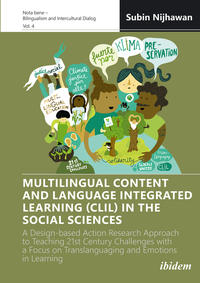
This book is directed at both researchers and teachers with an interest to establish a multilingual and cosmopolitan culture within classrooms; it contributes to research in Content and Language Integrated Learning (CLIL) on multiple levels. The theoretical part sketches a conceptual framework with a competence model for the promotion of global discourse competence as the center of gravity for multilingual CLIL in the social sciences. Along the leitmotif of climate change, the construction of ‘cosmopolitan classroom glocalities’ for supporting learners’ 21st century skills is suggested. Besides defending design-based action research as a research method for bridging the gap between theory and practice, two empirical contributions from a German 10th grade CLIL classroom with English as target language make the preceding theoretical framework tangible. One chapter deals with more language-related issues, whereas the subsequent chapter takes a subject turn. At first, a comprehensive model for multilingual CLIL is presented. It builds on the novel concept of translanguaging, adapted to ‘trans-foreign-languaging’ for facilitating multilingualism as a daily norm. Thereafter, the model’s effect on political judgments is investigated. This chapter concludes in proposing the genesis of a ‘perfect equilibrium of emotional and rational learning’ for promoting empathy, solidarity, and justice within a democratic and transnational civil society.